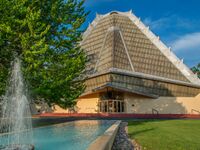Civil Society/Religion/Overview
– William Penn

Philadelphia was a city founded as a religious experiment. Its Quaker roots gave way to rich religious diversity. Historic churches of every imaginable denomination dot the city's landscape, while modern progressive congregations assemble in disused storefronts or in the basements of schools to spread their own brand of religion. Contrary to the perception of the east coast as a haven for Ashkenazi Jews with a history solely of Christian Protestantism, the oldest synagogue in Philadelphia dates to the 1740's and houses a Sephardic congregation. By comparison, Islamic congregations are relatively new to the region, most appearing in the 1960s or later. But Hindu temples, pagan assemblies, Unitarian Universalist churches, and even Scientologists have house of worship here.
Most Philadelphia congregations regardless of their religious affiliations tend toward the progressive here. The number of LGBT pride flags you will find flying outside houses of worship would surprise and even shock a more conservative mind. Many have a focus on charity, on housing the homeless, feeding the hungry, healing the sick, and generally improving their communities. They are havens for those who seek to do good, and sanctuaries for those who know they've done wrong. Recent years have seen a stark demographic shift among the faithful, as some denominations dwindle and others begin to thrive.
Religious institutions have their fingers in many pies in the region. Hospitals bear the names of religious organizations, politicians court the support of religious leaders, and the more activist congregations feed the media a constant supply of public interest stories and controversial coverage. For better or worse, religion remains one of the most critical avenues of social change within the region. And controlling it a means of maintaining the status quo.